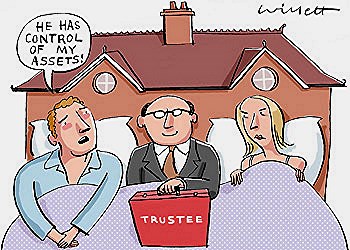Duties of an Executor or Administrator of an Estate
A personal representative, whether an executor by a will, or an administrator appointed by the court, has a duty to act solely and exclusively for the benefit of the beneficiaries. This duty is construed strictly, and forbids a personal representative from making a profit that is not authorized, or occupying a position where the personal representative’s self interests would conflict with the duty to the beneficiaries.
The Courts of Equity have required personal representatives to ensure that each beneficiary receives exactly what he or she is entitled to receive under the will or the estate. The personal representative must maintain an “even hand” when dealing with all beneficiaries.
The personal representative has a duty in exercising all of his or her powers, whether discretionary or administrative, to maintain the standard of care of a reasonably prudent businessperson managing someone else’s property.
Generally speaking, the personal representative cannot delegate his or her duties. The Courts in recent years however have permitted delegation of administrative duties that a reasonable and prudent businessperson would delegate in the management of his or her own business affairs. This would include the use of brokers, real estate agents, accountants, lawyers, appraisers and so forth.
The personal representative’s general duties are as follows:
Duties of an Executor or Administrator
(1) To dispose of the deceased’s body.
It is the executor and not the testator’s spouse or family, who has the right to determine the place and manner of burial. The Cemetery and Funeral Services Act sets up a priority structure as to who has the right to control the disposition of human remains. First priority is given to the executor, then to the spouse, and then to various categories of relatives. If the person who has the right to control disposition is unavailable or unwilling, the right passes to the next person of the priority list. Proper funeral expenses incurred are payable out of the estate. Generally, the person who instructs the funeral director will be personally liable to pay all expenses incurred, but is entitled to indemnity as a first priority against the estate for the reasonable expenses of a suitable funeral. There are some cases where the executor has been denied reimbursement of the full funeral costs, where the costs have been found to be excessive under the circumstances.
(2) Take possession or control of the deceased’s assets.
The personal representative must take steps to search for any cash, jewelry, valuables and the like, and arrange for their safekeeping. Any personal property must be locked up and properly insured. Other assets that may require insurance coverage must also be checked into. Financial institutions and government agencies must be notified of the death. Mail must be re-directed and the bills, including mortgages, must be paid. Rents must be either collected or paid and businesses must be managed for the interim until distribution of the estate or until the sale of the business. A personal representative must enquire as to whether they have sufficient legal authority to carry on the business, and must also be cognizant of the potential for personal liability for carrying on the business.
(3) Complete a schedule of all of the deceased’s assets and ascertain their value.
After the executor has taken charge of the assets of the estate, and has made a full inventory of the assets and a valuation of same, the personal representative should then arrange to have an application made to the court for the issue of a grant of probate. In the case where the deceased dies intestate or without a named beneficiary, there is often a delay experienced in finding some appropriate person to step forward and apply for letters of administration.The Rules of Court, seem to assume that in practice, in the absence of special circumstances, the court will usually give priority to appointing as administrator of the estate, the person or persons who have the greatest interest in the estate. In practice consents will be required from any person entitled to share in the estate who has a greater or equal right to apply. Thus, if two or more persons are equally entitled to apply, they must either apply jointly, consent to the appointment of one of them, or be served with notice under the Rules of court. There is no limitation on the number of administrators who may be appointment.
(4) Advertise for creditors.
Before any debts of the estate are paid, the executor or administrator should see to the publication of the proper advertisement for creditors, claims and other claims against the estate. From my experience, common sense should prevail in deciding whether or not to advertise for creditors, as the costs can be considerable. In the case of a little old lady with simple assets and a history of paying her bills on time, it may not be necessary to publish such an advertisement. However if the personal representative is to protect him or herself from liability, then serious consideration should be given to the placement of such an advertisement, as Provincial Legislation states that the personal representative shall not be personally liable to creditors, where notice has been properly given and the assets of the estate have already been distributed.
(5) To notify beneficiaries, and persons who would take on an intestacy with respect to an application for probate or letters of administration;
(6) To act personally, although as aforesaid, delegation may be allowed in certain administrative circumstances;
(7) To ensure that investments are authorized.
There is a duty to examine the assets and investments of the estate, and in general, to convert in a reasonable and timely manner, the assets that do not qualify as authorized investments for the estate. The executor must be concerned with assets that may waste (ie, an unheated greenhouse) or that are to speculative (penny stocks), or reversionary assets;
(8) To complete and file income tax returns and where necessary obtain a Clearance Certificate from Revenue Canada;
(9) To pay the debts, including funeral, legal, testamentary expenses, succession duties and probate fees;
(10) To claim all debts due to the deceased and generally collect all of the assets;
(11) To keep accounts:
The personal representative has a duty to be prepared to account to creditors and to persons who have a beneficial interest in the estate. The personal representative must give to anyone to whom he or she owes a duty such information as that person reasonably requires. The type and amount of information varies, but the duty to account is owed to beneficiaries, unpaid legatees, unpaid creditors, successors, trustees, others who may have an interest in the deceased’s assets, and others provided for by statutes such as the Public Guardian or Revenue Canada.
(12) To continue or bring and maintain court actions on behalf of the estate:
Under Section 59 of the Estate Administration Act, a personal representative of a deceased claimant may continue or bring and maintain an action for a loss or damage to the person or property of the deceased in the same manner and with the same rights and remedies as the deceased, except for certain actions such liable and slander, pain and suffering, and loss of expectancy of earnings. A personal representative may continue or bring and maintain an action under the Wills Variation Act, or an action for constructing or resulting trust on behalf of the deceased.
(13) To distribute the assets in accordance with the will or the laws of intestacy.









